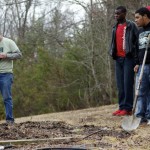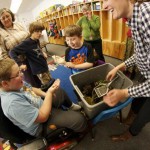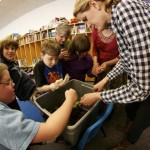- John Murphy breaks ground in the garden with Hendersonville sophomores as part of Bullington Garden’s horticultural therapy program. Photo by Nathan Metcalf
- April Peterson digs through the worm bin with students Fairview Elementary School. Photo by Nathan Metcalf
- Photo by Nathan Metcalf
Each week, horticultural therapist April Peterson volunteers in a classroom of students with intensive special needs at Fairview Elementary School. As a part of the therapy program, students plant seeds, write in their nature journals, water the outdoor gardens and more. “It’s a break for them,” says Peterson. “It’s something that takes the stress out of their day.”
On her latest visit, however, she was met with a room full of yelling, jumping and agitated children. Why the frenzy? Well, their worm bin — an indoor composting tool that the kids built with Peterson’s guidance — had sprouted grass.
“We took the worm bin down and we opened it up, and everybody was just screaming and excited,” recalls Peterson.
A week earlier, the group had performed an experiment, adding extra wheatgrass seed from a previous project to the compost vessel.
“It was especially fun to see from start to finish that they made that worm bin, they monitored it, fed it, now they are experimenting with it — and that’s flat-out something that they would not be doing if horticultural therapy wasn’t in their classroom.”
While the uses for horticultural therapy vary, the goals for Peterson’s group include staying on task, sharing, using patience and working on fine motor skills and tactile sensitivities.
Getting kids — especially those with special needs — excited about plants is Peterson’s passion. It’s also what led her to obtain her horticultural therapist certification at the Horticultural Therapy Institute, which offers credits through Colorado State University. She began the therapy program at Fairview Elementary last year as part of her certification requirements, and it remains the first of its kind in the Buncombe County Schools.
Peterson’s work at Fairview Elementary and, more recently, at Glen Marlow Elementary School in Mills River, owes some thanks to another local horticultural therapist, John Murphy, director of the Bullington Gardens, a public garden and educational horticultural center in Hendersonville. There, he runs a horticultural therapy program for sophomores in high school with special needs. Under Murphy’s guidance, Peterson completed an internship for her therapy program at Bullington Gardens, and Murphy helped her to develop a therapeutic program for the students at Fairview Elementary.
Murphy started his program, BOOST (Bullington Onsite Occupational Student Training), in 2003 before he “really knew there was anything called horticultural therapy,” he says. Since then, he, too, has received formal training in the discipline from the Horticultural Therapy Institute in Denver. Each week, students from four Henderson County high schools go to Bullington Gardens to work on the grounds, gardens and greenhouse.
Students also design and install gardens to enter into an annual garden competition among the schools. They pick a theme for the garden, stay within a budget and include elements like stone and birdhouses. The students, says Murphy, “have probably struggled with the traditional classroom setting their whole lives, so when they come out here, it fits their style of learning a little bit better. It’s more hands-on; they don’t have to be sitting at a desk.”
Special education teacher Sloan Neuburger of North Hendersonville High School says the vocational training is one benefit of the BOOST program, but the effects are much broader. “The part that always happens that I think is kind of the magic of the Bullington Gardens,” says Neuburger, “is that their ultimate goal is that they develop work skills, but somehow they also develop a level of confidence out here that they didn’t have in the classroom. … They realize that they can do something that they never thought they could do.”
At the end of the program each year, the students must present their gardens to a sizable audience of teachers, parents and peers — Murphy says attendance can be as high as 100 people. And Neuburger says the finished products “are some of the most beautiful gardens you’ve ever seen.” But the best part, she says, is watching the students present their work. “These are students who have never spoken in class, who have never volunteered an answer. … It’s one of the most emotional days of my year,” she says.
Students with varying levels of ability come to Bullington Gardens for therapy, and the goals and activities at the center are adjusted to meet the needs of the students. Volunteer Mary Martin teaches a group with severe physical and intellectual disabilities. That group focuses less on job skills and more on developing skills like communication, basic math, following directions and coordination. All of these areas, says Martin, can be strengthened with the help of plants.
“I think it all goes back to that nonthreatening aspect,” says Martin. “Plants are nonthreatening. They relate to all of the senses. No matter what kind of handicap you have, there is always a plant that you can relate to. Whether it’s a fuzzy leaf or a smell or a bright color, you can always identify with something.”
With the growing popularity of school gardens, Peterson says it’s a “logical progression” for the horticultural therapy movement to catch on. And while she says it’s great that more schools are recognizing the value of gardens on school property, many of the same schools could do a better job of making those gardens accessible for all students.
Accessibility was exactly the motivation behind Peterson’s partnership with Warren Wilson College last fall to create a wheelchair-accessible garden within Fairview Elementary’s already well-developed outdoor garden space.
“It has a raised garden bed so the kids that I work with have an easier time,” says Peterson. Not only are the new garden beds wheelchair-accessible, but the structure makes it easier for students with autism and other conditions or sensitivities to get involved. “It’s a lot more accessible to them to be able to walk right up to it without getting wet or excessively dirty, and they’re able to engage,” explains Peterson.
Finding a way for students to experience gardening is really the driving force for all these teachers and therapists — because they have seen firsthand the positive effects a garden can have. “They just need that help, that guidance, to get to these places everyone takes for granted,” says Peterson. “To easily get into the garden, to easily go on a hike — these populations can’t necessarily do that without the support system, and I think horticultural therapy creates that support.”
To learn more about Bullington Gardens, visit bullingtongardens.org. To learn more about the Horticultural Therapy Institute, visit htinstitute.org. The institute will offer classes at Bullington Gardens in a series beginning May 3. Bullington Garden’s therapy programs subsist on donations and fundraising efforts. Readers can show their support for the initiative at an upcoming plant sale on Friday and Saturday, April 25 and 26.







Before you comment
The comments section is here to provide a platform for civil dialogue on the issues we face together as a local community. Xpress is committed to offering this platform for all voices, but when the tone of the discussion gets nasty or strays off topic, we believe many people choose not to participate. Xpress editors are determined to moderate comments to ensure a constructive interchange is maintained. All comments judged not to be in keeping with the spirit of civil discourse will be removed and repeat violators will be banned. See here for our terms of service. Thank you for being part of this effort to promote respectful discussion.